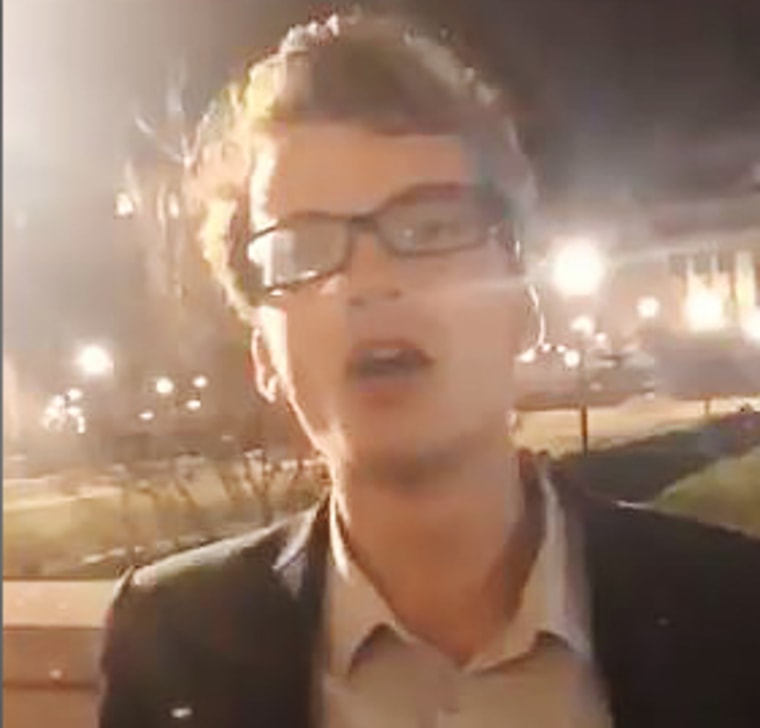When Julian von Abele said it on tape, he was exuberant.
“White people are the best thing that ever happened to the world.”
In the days since von Abele, a white Columbia University student, yelled a fact-challenged theory on the inherent and historical greatness of white men at a group of black students and went viral, the familiar rituals surrounding racism caught on tape have begun again.
First deny. Then attempt to obfuscate with a laser focus on language, numbers and alleged threats to civil liberties. Finally, ride out the social media storm until the next racist outrage video comes along to begin the cycle again.
“I am not a white supremacist or racist,” von Abele wrote in an emailed statement Tuesday evening. “[N]or do I subscribe to any views that support that ideology...I believe that...we should all be allowed to be proud of our heritage. As such, I would like to have my views be fairly considered in the public discourse, and not dismissed solely due to my race and gender.”

Watch. React. Repeat. Those who study white nationalist indoctrination and ideas and their role in shaping American history say the ritualized outrage and denial distract the public from important truths, blur historical lessons and facilitate the seep of white nationalist ideas into an already unequal society.
On Reddit, von Abele’s defenders ridiculed those who called him racist and recast his rant as drunken “truth.” InfoWars described von Abele as the victim of an “out-of-context” video. And von Abele’s father, Rudolph von Abele, told NBC News when reached briefly by phone that his son’s comments are not “relevant to a story about the mainstreaming of white nationalism.”
“The parents, the neighbors, the friends — they always seem to say they don’t think this stuff is racist, their son, their friend isn’t a white nationalist,” said Heidi Beirich, who leads the Southern Poverty Law Center's Intelligence Project, which tracks and estimates the size, influence and methods of hate groups.
“But wear the label or not, the stuff the Columbia student said, those are absolutely standard tropes of white nationalism,” Beirich continued. “It’s actually some of the stuff they put in their brochures and pamphlets.”
On Tuesday, a Virginia jury recommended a life sentence for another young, white man who made racist public statements — and who ultimately took violent action. But before the man, James Fields, drove into a crowd of counter-protesters at a 2017 white nationalist rally in Charlottesville, Virginia, killing one woman and injuring at least 40 others, his online racism drew little attention.
The jury’s recommendation followed evidence that Fields, who traveled from Ohio to Virginia to attend the rally, had spent the preceding months posting racist ideas and memes on social media. This included an image of a car driving into a crowd of protesters. Fields’ mother has said that she believed her sometimes violent son was headed to a Trump rally, and she did not know him to be a white nationalist.
“He knew where to go, who to meet up with, what to wear,” Beirich said, based on court documents. “He had on the uniform of Identity Evropa,” a white nationalist group. “But all of that, plus the fact that he was quite angry and trying constantly to make the point that white men are better than others, wasn’t enough to register as white nationalist sympathies to some of the people who knew him.”
Von Abele’s views also did not appear to register as problematic to his family — and even Columbia’s statement on the Sunday incident uses the terms “racially charged” and “painful” rather than “racist” to describe it. (The statement, from a trio of deans, is titled “Denouncing racism on campus.”) Von Abele has not been accused of causing anyone physical harm.
Von Abele declined to be interviewed but sent a written statement in which he describes himself as the video’s real victim and a champion of free speech.
“Since this event, I have received credible threats to my safety,” von Abele wrote in the statement. “I have been harassed, and my personal information has been released. I am not afraid to challenge the use of the term ‘white privilege,’ and labeling that view as racism creates divisiveness and stifles free thought and expression.”
Kwolanne Felix, also a Columbia student, anticipated some of that.
As von Abele ranted about the “European” origins of mathematics and medicine, disciplines that originated in Africa, the Middle East and Asia, Felix was there. She was part of a group of black students headed to a late-night meal who say von Abele followed them. To Felix, he seemed drunk, an allegation von Abele’s defenders have focused on without any public confirmation from him.

“It’s true that people drink all the time in college,” Felix said. “But, my experience with that at Columbia doesn’t equate to people yelling white nationalist ideas and demanding, I guess, gratitude. This was different.”
She worried the situation was about to become violent. And, if that happened, Felix thought, von Abele could simply do what others have and claim that he feared for his safety in a group of black students. Felix started live streaming.
“We understand, as black people, how easy it is for his narrative to be constructed, believed.”
In the days since, Felix has taken note of the way that von Abele’s textbook white supremacy claims, his insistence that white men are silenced and disrespected, have been embraced online by some as the truth and explained away on campus as youthful hijinks or just another opinion.
“The thing is, these incidents, these confrontations, are happening everywhere,” Felix said. “Maybe it’s just easier to see here but at least part of the problem has to be how many people are so unaware, ill informed, about so much of the world and yet, that situation does not hinder them at all.”
In August, a University of Alabama researcher found that about 6 percent of white Americans surveyed share the alt-right’s views, including a strong sense of white racial victimization, solidarity and pride. Last year, in a Washington Post/ABC News poll just after Charlottesville, 9 percent of white Americans said it was acceptable to hold neo-Nazi or white supremacist views.
And, in a testament to the power of white supremacy, when the General Social Survey asked in 2016 if racial disparities in housing, jobs and income were due to “inborn disability,” 7 percent of white Americans responded yes. But 13 percent of blacks did too.
“I’m alarmed by all the self-identified white nationalists in this country,” said Linda Gordon, a historian at New York University who wrote the book “The Second Coming of the KKK,” detailing how at its peak in the 1920s, the Ku Klux Klan’s ideas became almost synonymous with white, Protestant evangelical thinking.
Gordon said those who quietly hold racist beliefs are far more prevalent — and in some ways more powerful — than those who openly identify as racist. During the 1920s, the Klan counted 11 governors and dozens of members of Congress as members. They were put in power by millions of people who may or may not have publicly claimed Klan membership or a belief in white supremacy, but still supported them.
“This is why I think, today, the far bigger threat is the volume of people who share those views,” Gordon said.
